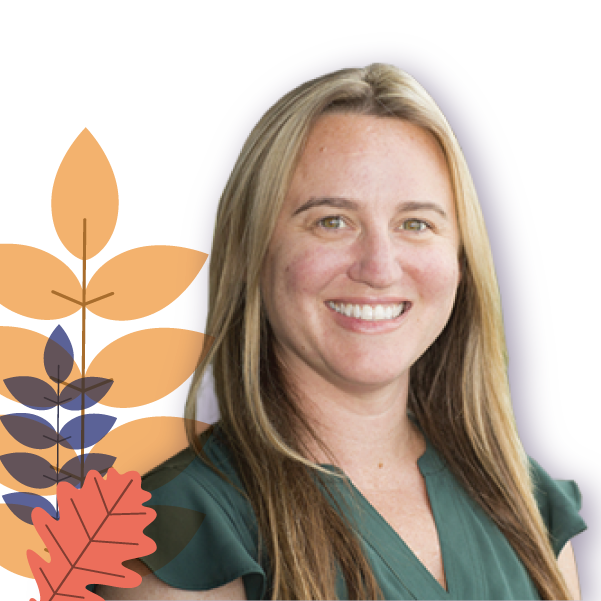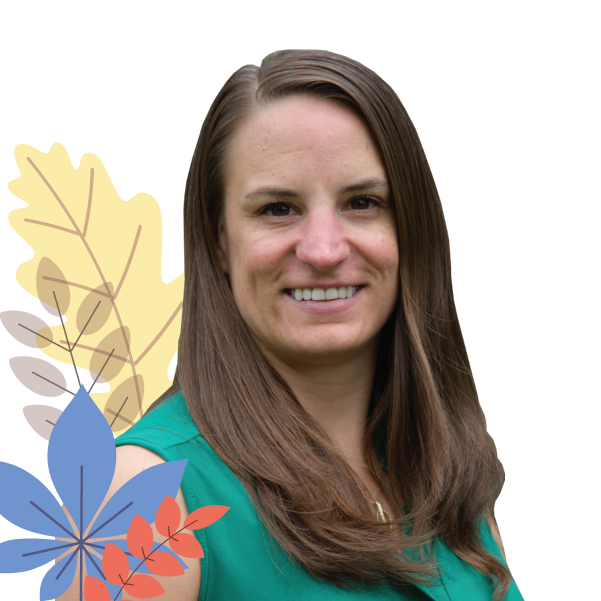Fall Conference Season
IS HERE!
Ahhh, Fall, that time of year when the temperatures get a little cooler, the air is filled with pumpkin-spice, and our amazing subject matter experts are gearing up to hit the road! We have an impressive Fall conference line up this year so feel free to peruse all the details below!
October's events

SEEA | Atlanta, GA | Wed Oct. 5th
9:15-10:15 AM
Decarbonization Strategies for the Southeast
Panelist: Megan Campbell
Corporations, utilities, local governments and others have prioritized reducing greenhouse gas emissions and achieving their ESG goals. Successful decarbonization strategies combine hyper-local knowledge and engagement with industry-leading technology. Join an interactive conversation with a panel of experts who will share how industrial facilities, utility programs, municipal government and transportation sectors can find a pathway forward to meet their decarbonization goals
Grid Fall Forward | Denver, CO | TUES Oct. 25th
3:00 PM
Steps to Grid Resiliency by Engaging and Empowering EV Owners
Panelist: Hilary Polis
This panel will highlight best practices for engaging EV owners in load management opportunities throughout the entire customer journey and discuss the changes that need to take place to optimize EVs as a grid resource.


SECC Meeting & Fall Workshop | St. Louis, MO | WED Oct. 26th
9:15 AM
Strategic Dialogues: SECC Research Committee Breakout Session – Part One
With Jordan Folks, SECC Research Chair
The 2022 Members Meeting and Fall Workshop will be hosted by Ameren Missouri and Ameren Illinois! This breakout session will provide attendees the opportunity to discuss the ways to collectively understand consumers, grow consumer knowledge around smart energy initiatives and expand SECC’s stakeholder engagement efforts.
November's events

IEPEC | San Diego, CA | TUES Nov. 1st
8:30 AM – 12:30 PM
Workshop: Evolving Evaluation 202: Evaluation and Cost Effectiveness in a DER World
Instructors: Olivia Patterson, Opinion Dynamics
& Steve Schiller, Schiller Consulting
Evolving Evaluation 202 takes workshop participants on the evaluators’ journey to explore DER programs focusing on evaluation and cost-effectiveness practices. Using interactive exercises relevant to select case studies related to GEBs and Building Electrification programs, participants leave having a solid understanding of what is required to conduct meaningful and useful evaluations as well as their implications for cost-effectiveness testing today and in the future.
IEPEC | San Diego, CA | Wed Nov. 2nd
3:15 – 5:15 PM
Session 3B: Non-Energy Impacts Come of Age, Finally!
Save Energy, Breathe Better: Quantifying the Societal Health Benefits of Improving Air Quality Through Energy Efficiency
Presented by Aaiysha Khursheed
Quantification of societal non-energy impacts (NEIs) provides an opportunity to capture benefits from energy efficiency programs that are agnostic to specific measures, programs, and participant populations. Regardless of the program design or population served, decreased energy consumption reduces the combustion of fossil fuels and translates into improvements in ambient air quality and public health. Aaiysha will illustrate how utilities can account for societal NEIs in cost-effectiveness testing and achieve the policy goals of regulatory agencies and policymakers.


IEPEC | San Diego, CA | Wed Nov. 2nd
3:15 – 5:15 PM
Panel 3D: EM&V for Electric Vehicles: Deciding When to Travel the Beaten Path and When to Pave New Roads
Panelist: Hilary Polis
IEPEC | San Diego, CA | THUR Nov. 3rd
8:30 -10 AM
Session 4B: Codes, Standards, and TRMs
Electrifying TRMs at the Convergence of Decarbonization Policy, Program Delivery, and Evaluation
Presented by Kevin Ketchman
As states and municipalities adopt decarbonization policies, energy efficiency (EE) program administrators, implementers, and evaluators are transforming traditional EE programs to capture new goals related to efficiency, electrification, and carbon reduction. A key consideration is how programs and evaluators will quantify the combined impacts of energy efficiency and electrification. Energy efficiency programs often rely on Technical Reference Manuals (TRMs) to document standardized and transparent methods for quantifying energy and demand impacts from energy efficiency measures, but few existing TRMs include methods for fuel-switching or electrification effects. Kevin will discuss the core differences between a traditional and electrified TRM, implications to program and measure performance, and lessons learned from the evaluation, implementation, and EE program teams’ perspectives on the process for electrifying the TRM.


IEPEC | San Diego, CA | Thurs Nov. 3rd
8:30 -10 AM
Session 4D Residential Heat Pumps: Costs, Emissions, Savings… and Barriers
What is the Final Bill for a Heat Pump Residential Retrofit Installation? A Dephi Approach to Uncovering the Costs of Electrification’s Favorite Technology
Speaker: Dr. Ellen Steiner
In the state of California, direct emissions from buildings comprise 12% of the State’s GHG emissions and mostly stem from natural gas appliances such as furnaces and water heaters. Heat pumps will be instrumental to reducing building energy use because they offer a low- or no-carbon pathway to meeting critical building functions (e.g., water and space heating) that have traditionally been achieved through GHG-emitting appliances. To meet the ambitious climate goals in California, however, the prevalence of heat pumps across California will need to increase and fast. Understanding the full installation costs of heat pump installations will inform program theories of change, bolster program designs, and refine theoretical consumer economic models. In this paper, we report on the findings from a Delphi study on air source heat pump and heat pump water heater installation costs. For this effort, we utilized a Delphi approach to collect primary data on heat pump costs from water heater and HVAC contractors
IEPEC | San Diego, CA | THUR Nov. 3rd
10:30 -12 PM
Session 5C: Equity: Insights from Hard-to-Reach Customers
We can have the cake and eat it too: A case study of how financing can bring clean energy projects to disadvantaged communities
Speaker: Megan Campbell
Megan will explore financing’s role in ensuring that disadvantaged communities have equitable access to beneficial electrification, decarbonization, and clean energy sources. Her presenation will draw from multiple policy directives, financing pilot initiatives, and recent research and evaluation results that explore the opportunities and challenges of financing as a strategy to give disadvantaged communities equitable access to clean energy.


IEPEC | San Diego, CA | Thurs Nov. 3rd
10:30 am – 12:00 pm
Session 5D: It’s Electric! Insights into our Customers’ Electrification Journeys
Magnitude Matters: Re-evaluating Traditional Cost-effectiveness Practices for Electrification
Moderator: Sharyn Barata, IEPEC President
Speaker: Jayden Wilson
Heating electrification offers utility customers an opportunity to increase comfort, and improve their health, while also making significant contributions to carbon reduction goals. It is vital that heating electrification programs are evaluated for cost-effectiveness in a manner consistent with other distributed energy resources and appropriate considering their potential grid impacts. In this upside-down world of negative savings, shifting load profiles, and increasing DERs, heating electrification programs and measures will require new approaches to benefit-cost analyses and avoided cost calculations to ensure their application remains theoretically sound.
IEPEC | San Diego, CA | THUR Nov. 3rd
1:00 -2:30 PM
Session 6C: Reaching Out: Methods for Equity Research
Providing Avenues to Electric Vehicle Ownership for Ride-Hail Drivers
Speaker: Zac Hathaway
Electric vehicles (EVs) are the future of transportation and will be critical to achieving a reduction in greenhouse gas emissions. Despite increasing sales, EV market share hovers around 6% nationwide and EV use is dominated by higher-income early adopters. Rideshare drivers are a natural market for EVs given the high number of miles they drive and the lower cost of ownership of EVs compared to gas-powered vehicles. However, the higher purchase price of EVs presents a significant barrier to purchase given the lower incomes of many ride-hail drivers.
This presentation will explore how utilities can work with transportation network companies (TNCs) to increase awareness of and interest in EVs among ride-hail drivers. We will also examine how providing centrally located charging infrastructure and attractive EV charging subscription plans can both increase utilization of utility-provided charging and make EVs more attainable for ride-hail drivers.


IEPEC | San Diego, CA | FRI Nov. 4th
10:30 am – 12:00 pm
Session 59A: Heat Pumps and Heat Pump Water Heaters
Learning from Those Who Came Before: How Utility Incentive Programs Can Alleviate Supply Chain Friction for Heat Pump Water Heaters
Speaker: Dr. Jen Loomis
Heat pump technologies will play a central role in building electrification, yet adoption of heat pumps for water heating has lagged behind that of heat pumps for space heating.
Jen will present a comprehensive picture of how the residential heat pump water heater market functions and how utility programs can intersect with the supply chain to reduce friction points. She will distinguish findings between single-family and multifamily markets, as well as between new construction and retrofit markets. The audience will walk away with a greater understanding of the market dynamics that programs must address to spur adoption of heat pump water heaters. This knowledge will serve evaluators well, as it is expected that the heat pump programs will continue to grow as climate goals increase.
BECC | Washington DC | Mon Nov. 14th
10:30 am – 12:00 pm
New Developments in Evaluation
Moderator: Sharyn Barata


BECC | Washington DC | Mon Nov. 14th
3:30 – 5:00 pm
Changing Contractor Behavior in the Age of Decarbonization
Speaker: Dr. Ellen Steiner
PLMA | Phoenix, AZ | MON Nov. 14th
9:00 AM – 4:30 PM
TRAINING CLASS: EVOLUTION OF DR TO DER
This one-day class explains how today’s demand response initiatives are evolving to interact with a future that includes distributed energy resources for peak load management, and much more.
Trainer: Kessie AVSEIKOVA
2:30 – 4:30 PM
ELECTRIC TRANSPORTATION INTEREST GROUP
KESSIE AVSEIKOVA, CO-CHAIR


PLMA | Phoenix, AZ | MON Nov. 14th
2:30 – 4:30 PM
Retail Pricing INTEREST GROUP: Consumer Understanding of Billing, Payment Options and Rate Plans
Speaker: JORDAN FOLKS, Retail Pricing interest Group Co-chair
Electric utilities today are exploring different types of rate plans and payment options for residential customers, including time-of-use rates, prepay plans and more. However, it is unclear what consumers know about these new offerings and what their perceptions are. We’ll explore consumer knowledge of how rates are structured; what they believe impacts their bills; which aspects of their bills result in the greatest level of concern; what they think about prepay plans, green pricing plans and much more.
PLMA | Phoenix, AZ | TUE Nov. 15th
10:00 – 10:30 am
General Session 2
Speaker: Olivia Patterson, Executive Committee


PLMA | Phoenix, AZ | WED Nov. 16th
11:30 am – 12:00 pm
Can Passive House Construction Shape Demand and Increase Grid Reliability?
Speaker: Dr. Jordan Wilkerson
Be in the know first!
Get in-depth insights delivered right to your inbox! We understand your inbox and time are valuable, and we only want to provide content that speaks to you on the topics you’re most interested in. We’ve got some incredible projects in the works; join our mailing lists to be in the know first about our findings!
